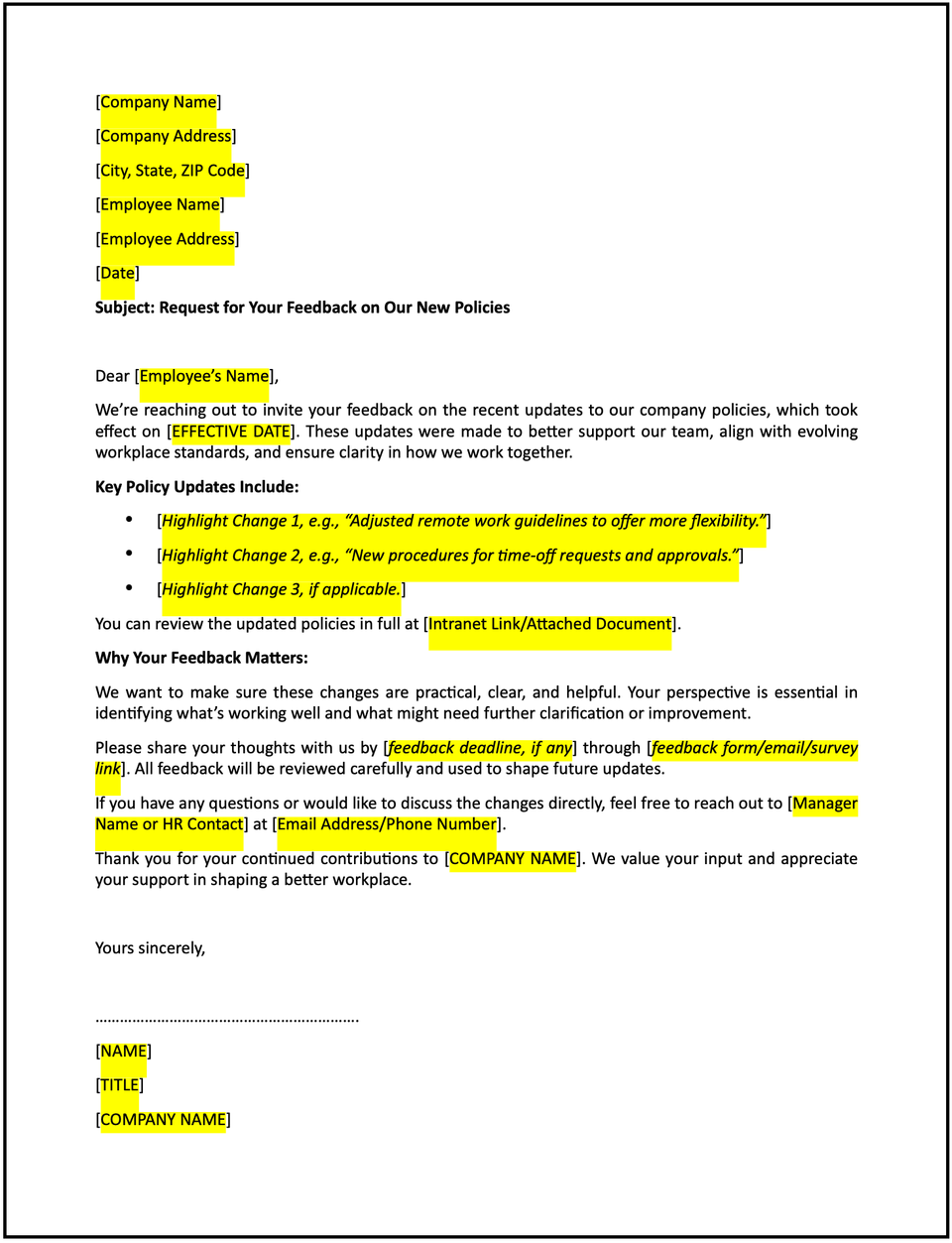Letter of request for employee feedback on new policies: Free template

Letter of request for employee feedback on new policies
A letter of request for employee feedback on new policies is a formal way to invite employees to share their thoughts and insights on recently introduced policies. This letter fosters open communication, promotes inclusivity, and ensures employees feel valued in the decision-making process.
How to use this letter of request for employee feedback on new policies
- Open with context: Begin by referencing the new policies recently introduced and their purpose.
- State the purpose: Clearly explain that the organization is seeking feedback to understand the policies' effectiveness and identify areas for improvement.
- Highlight the importance: Emphasize how employee input will help shape and refine the policies to better serve the organization and its team members.
- Provide guidance: Outline the specific aspects of the policies for which feedback is being requested (e.g., clarity, feasibility, impact).
- Share the feedback process: Specify how employees can share their feedback, such as through surveys, meetings, or written responses.
- Include a deadline: Provide a clear timeline for submitting feedback to ensure timely review and implementation of changes.
- Maintain a professional and encouraging tone: Ensure the letter reflects appreciation for the employees’ participation.
- Provide contact information: Include details for employees to reach out with questions or additional input.
Benefits of using a letter of request for employee feedback on new policies
This letter template ensures a structured and professional way to gather feedback while fostering transparency and collaboration. Here’s how it helps:
- Promotes inclusivity: Inviting feedback demonstrates that employees’ opinions are valued and considered.
- Encourages engagement: Employees are more likely to support policies they have contributed to shaping.
- Reflects professionalism: A well-crafted letter reinforces the organization’s commitment to open communication.
- Improves policies: Gathering diverse perspectives ensures the policies are practical, fair, and effective.
- Provides documentation: A formal record of the feedback request is valuable for HR and organizational processes.
Tips for writing an effective letter of request for employee feedback on new policies
- Be specific: Clearly describe the policies and the areas where feedback is needed.
- Use professional language: Maintain a respectful and encouraging tone to foster open communication.
- Highlight the purpose: Emphasize the importance of feedback in shaping better policies.
- Include next steps: Provide details on the feedback process, including how and where to submit responses.
- Keep it concise: Focus on the key points while ensuring the tone is professional and constructive.
Frequently asked questions (FAQs)
Q: What details should I include in this letter?
A: Include the purpose of the request, details of the new policies, feedback areas, submission process, and deadlines.
Q: Should I personalize the letter?
A: While a general letter works, addressing it to a specific group or department may encourage targeted and relevant feedback.
Q: Who typically sends this letter?
A: The HR department, management team, or policy creators usually send this letter.
Q: How formal should this letter be?
A: The tone should be professional yet approachable, focusing on clarity and inclusivity.
Q: When should this letter be sent?
A: Send the letter shortly after implementing the policies to gather timely feedback.
Q: Can this letter include incentives for feedback?
A: Yes, offering small incentives, such as recognition or prizes, can encourage participation.
Q: Is acknowledgment from the recipient required?
A: While not mandatory, encouraging acknowledgment ensures employees are aware of the request and timeline.
This article contains general legal information and does not contain legal advice. Cobrief is not a law firm or a substitute for an attorney or law firm. The law is complex and changes often. For legal advice, please ask a lawyer.


